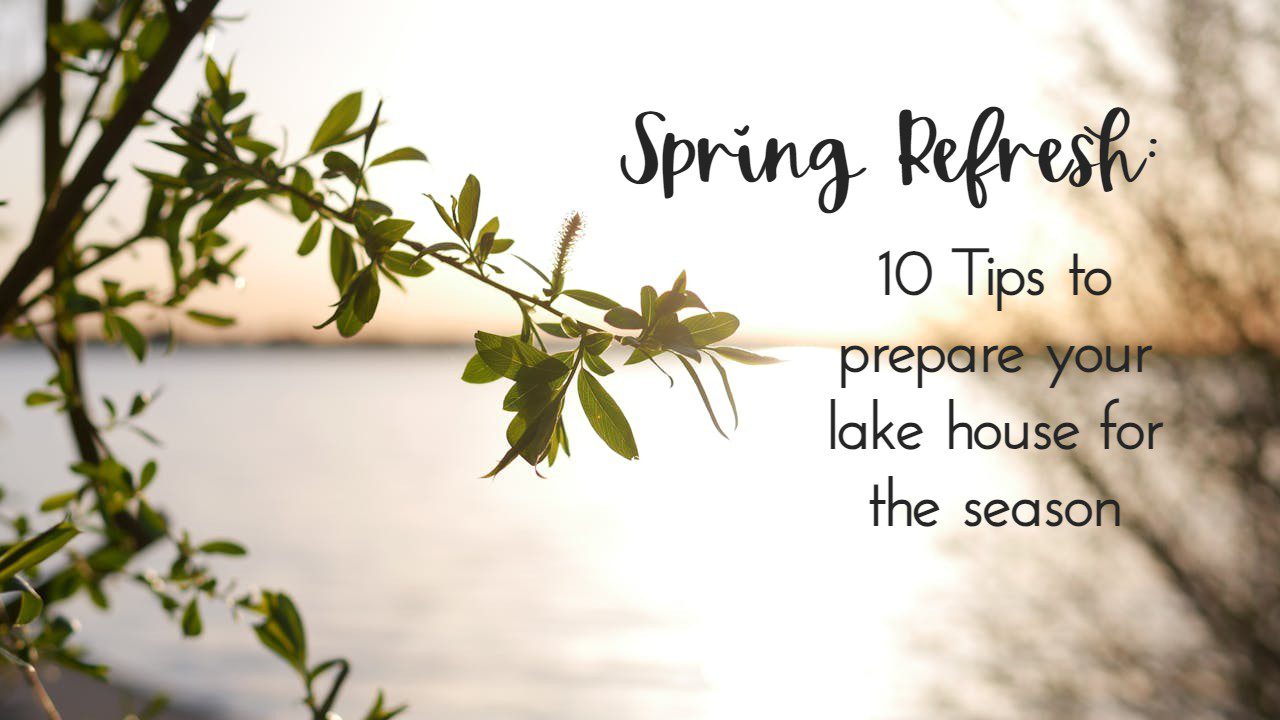How to Winterize Your Lake Home

It’s that time of year. Fall. Temperatures are dropping, the leaves are starting to change, and lake home owners are starting the process of taking boats out of the water and winterizing their homes. If this includes you, no doubt you want to return to your lake home next spring, with confidence that everything will be ready to go for another summer of fun and relaxation. And if you plan to visit occasionally in the off season, winterizing means protecting your property, while also being able to use it from time to time.
Whether you’re away for a few weeks at a time or all winter long, you definitely don’t want to return to any nasty surprises from the long, cold Michigan winter.
To be sure that doesn’t happen, here’s a checklist of things to do winterize your lake home this fall.
Inside the Home
Be sure that your power and water are in the proper mode for extended absences. If you heat your place in the winter, go ahead and dial down the heat, but probably not lower than 55 degrees. If you don’t heat in winter, be sure to drain the pipes by attaching a hose to the lowest point in the plumbing, and blow out all water with an air compressor. Then put antifreeze in the traps and drains.
Additionally:
- Clean or change the furnace filter to maintain an efficient heating and cooling system.
- Unplug electronics and appliances in case of a power surge or lightening strike.
- If you’re shutting off the refrigerator, leave the door cracked open to prevent musty smells from developing.
- Pull shades, or cover furniture to keep it from being bleached by the sun.
- Put mothballs or dryer sheets near linens.
- Restock and store first-aid kit.
- Take out all perishable foods; store those that remain in air-tight/critter-tight containers. If you don’t heat the cabin in winter, carry out canned goods so they don’t freeze.
- Turn off dehumidifier and hot water heater.
- Remove all containers used for fuel storage. You should also consider draining gas out of mower, trimmers and other lawn equipment, as well as draining the fuel line.
- Clean and dispose of ashes from fireplaces and wood stoves. Close damper for fireplace.
- Winterize washing machine; kitchen appliances.
- Check smoke detectors batteries and test them. If there’s ever an issue, a neighbor may be able to hear them go off in your absence.
Outside Your Lake Home
- Check for damage, clean, then store boats, docks/lifts, ladders, life jackets, ski equipment, patio furniture and other recreational items. Jot down any items you need to purchase for repairs. It’s easier to wait for a replacement part during the winter months, rather than during the summer, when you want to be out using them.
- Mow the lawn one last time.
- Check roof for loose or damaged shingles and make repairs accordingly, to avoid leaks.
- Clean out gutters
- Look for air leaks around electrical wiring, dryer vents, pipes, windows and doors; then seal leaks with caulk or insulation to keep out cold air and pests.
- Insulate pipes in crawl spaces by wrapping them with heat tape or thermostatically-controlled heat cables; also, open cabinet doors to allow heat to get to uninsulated pipes under sinks and appliances near exterior walls.
- Seal or cover vulnerable windows to prevent breakage.
- Blow out sprinkler system if you have one.
- Rake up or mow any thick areas of leaves covering grass to prevent mold from growing on your grass in the spring.
Winterizing Your Boat
- If your boat is in the water, do not take it out of the water until you are ready to winterize it. Water remains in the lower unit of inboard/out drives and plumbing, until flushed in the winterizing process. This water can freeze and do damage to your boat in a matter of hours if the temperature drops below 32 degrees. If your boat remains in the lake, it’s much slower to freeze.
- Michigan’s variable temperatures can create condensation inside the motors. To prevent condensation, spray a lubricant inside the motor.
- Check to make sure none of the seals are bad.
- Clean the bottom of the boat with a hull cleaner. There are different cleaners for aluminum and fiberglass boats, so be sure to get the right one for your boat.
- If you’re storing the boat outside, the boat should be covered or shrink-wrapped.
Of course, if you expect to be away for extended periods, nothing beats having someone take care of your property professionally. In areas with a lot of second homes, there are often businesses that offer home checks, as well as cleaning, gardening, lawn mowing, leaf raking and snow removal.
And last, but not least, thing Spring!







